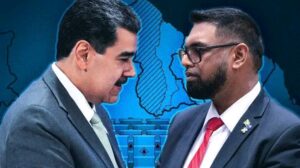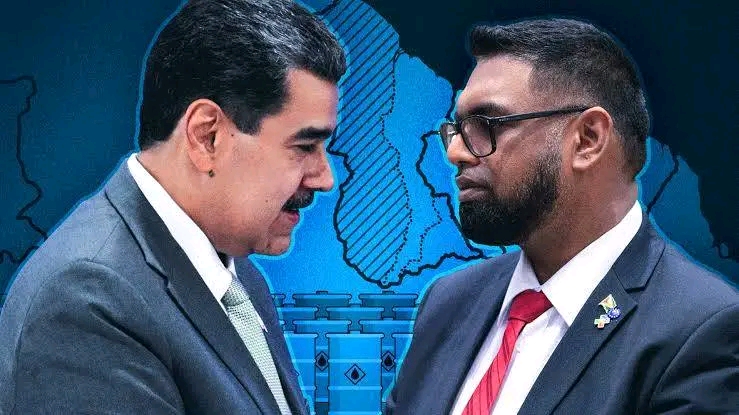Political Tensions Rise and Economic Transformations Emerge in Guyana Amid Oil Boom and Venezuelan Disputes

Guyana, a small South American country known for its lush rainforests and diverse cultural heritage, is currently navigating a pivotal moment in its history as an oil boom transforms its economic landscape. Discovered offshore reserves have positioned Guyana as one of the fastest-growing economies in the world. However, this newfound wealth has also brought to the forefront long-standing political tensions and disputes with neighboring Venezuela, complicating the nation’s path toward sustainable development and stability.
The Oil Boom: A Double-Edged Sword
In 2015, the American oil company ExxonMobil announced a significant discovery of oil in the offshore Stabroek Block. Subsequent explorations confirmed estimates of up to 11 billion barrels of oil, sparking enthusiasm about the potential revenues that could flow into the country. As production began in December 2019, Guyana’s GDP skyrocketed. Projections estimate that by 2025, the country could become one of the highest per capita income nations globally, rivaling wealthy oil states.
This rapid economic transformation has come with an influx of foreign investment and a surge in job opportunities. Yet, it has also spurred concerns about governance, transparency, and the equitable distribution of wealth. Critics warn that without proper management, the oil boom could lead to “Dutch disease,” where other sectors of the economy decline as the focus shifts to oil revenues. Furthermore, the potential for corruption and misallocation of resources looms large, raising serious questions about the government’s capacity to manage this windfall effectively.
Political Landscape and Governance Challenges
The emergence of oil as a cornerstone of the economy has intensified existing political rivalries. The ruling People’s Progressive Party/Civic (PPP/C) faces scrutiny over its ability to effectively manage oil revenues and uphold promises of inclusive growth. In the lead-up to the 2020 elections, the runoff was marked by allegations of electoral fraud and intervention, deepening the divides among political factions. The opposition, primarily represented by the A Partnership for National Unity + Alliance for Change (APNU+AFC), has accused the government of being opaque about oil contracts and revenues, demanding greater accountability and transparency.
The current political climate is charged, and the stakes are high, with civil society groups and international observers calling for reforms to enhance governance frameworks. Amid this backdrop, public protests have emerged, seeking assurances that oil wealth will translate into tangible benefits for all citizens, not just a select few. Ensuring the equitable distribution of oil revenues remains an uphill battle that could shape the future political landscape for years.
Venezuela’s Territorial Dispute
Compounding Guyana’s challenges is the long-running territorial dispute with Venezuela over the Essequibo region, which encompasses a significant portion of the country’s landmass and crucial natural resources. This dispute has its roots in colonial history, but it has gained renewed attention in the context of the oil boom. Venezuela, feeling threatened by its neighbor’s burgeoning oil wealth, has ramped up its rhetoric and military presence along the border.
In March 2021, the International Court of Justice (ICJ) ruled that it had jurisdiction over the matter, a decision that has been met with mixed reactions. While the Guyanese government welcomes the ruling and seeks a peaceful resolution, Venezuela has continued to reject the legitimacy of the ICJ’s authority. The uncertainty surrounding the territorial dispute, combined with geopolitical dynamics involving larger players like the U.S. and China, complicates Guyana’s position in the region and raises concerns over national security and foreign relations.
Moving Forward: Opportunities and Challenges
As Guyana moves forward with its oil production and economic development, balancing various political and geopolitical challenges will be crucial. The government must prioritize constructing robust institutional frameworks to manage oil revenues responsibly while addressing the needs and concerns of its citizens.
Furthermore, diplomatic efforts to resolve the territorial dispute with Venezuela require careful navigation. Engaging in constructive dialogue while fortifying domestic capabilities will be essential to ensuring the nation’s sovereignty and stability.
In conclusion, Guyana stands at a crossroads marked by unprecedented opportunities and significant challenges. The unfolding oil boom has the potential to transform the nation’s economy and lift many citizens out of poverty, yet it also necessitates a commitment to good governance, inclusivity, and diplomacy. As political tensions rise and economic transformations take shape, the future of Guyana will hinge on its ability to harness its resources responsibly while navigating the complexities of regional dynamics and internal governance struggles.



